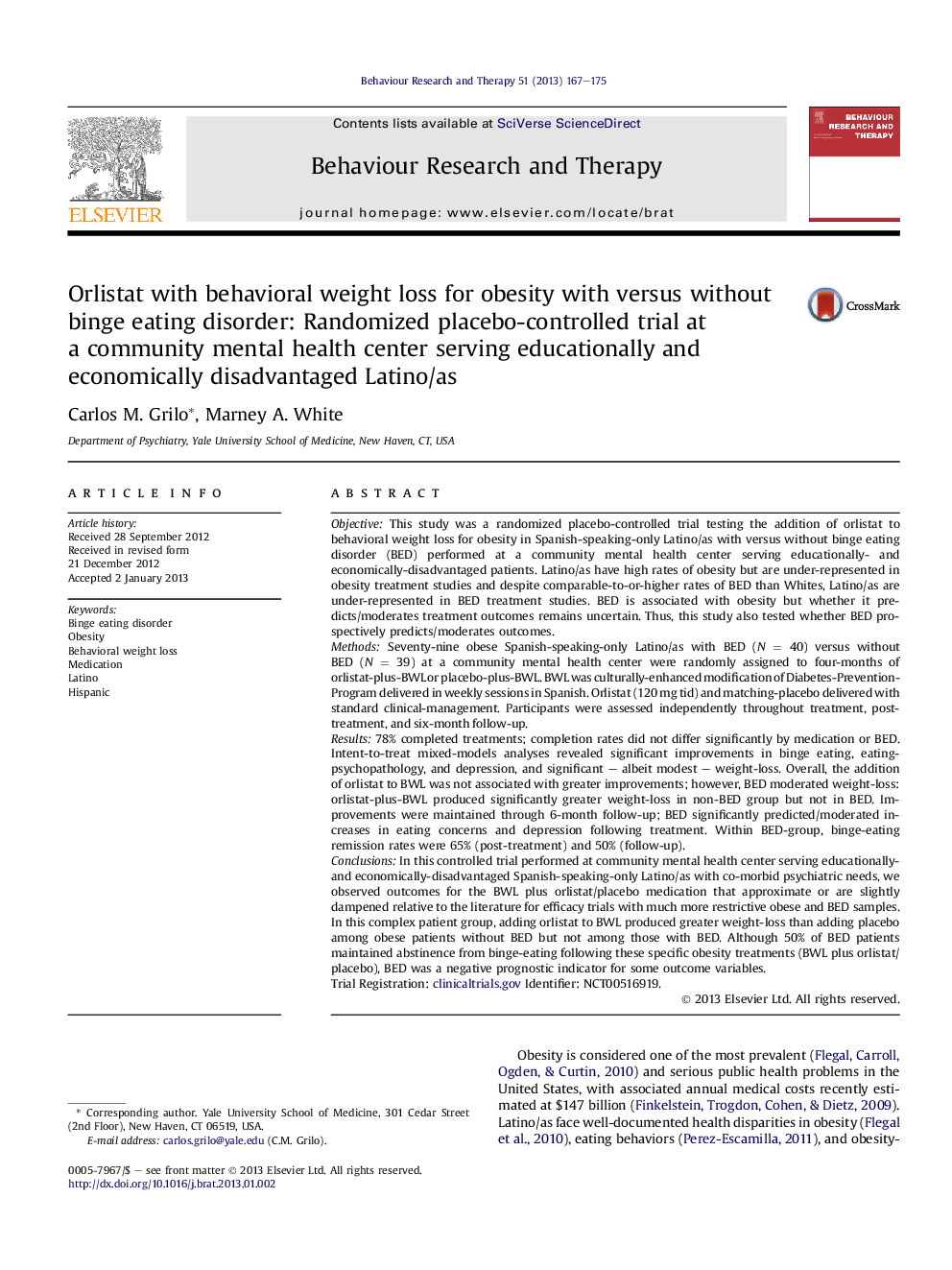| Article ID | Journal | Published Year | Pages | File Type |
|---|---|---|---|---|
| 901902 | Behaviour Research and Therapy | 2013 | 9 Pages |
ObjectiveThis study was a randomized placebo-controlled trial testing the addition of orlistat to behavioral weight loss for obesity in Spanish-speaking-only Latino/as with versus without binge eating disorder (BED) performed at a community mental health center serving educationally- and economically-disadvantaged patients. Latino/as have high rates of obesity but are under-represented in obesity treatment studies and despite comparable-to-or-higher rates of BED than Whites, Latino/as are under-represented in BED treatment studies. BED is associated with obesity but whether it predicts/moderates treatment outcomes remains uncertain. Thus, this study also tested whether BED prospectively predicts/moderates outcomes.MethodsSeventy-nine obese Spanish-speaking-only Latino/as with BED (N = 40) versus without BED (N = 39) at a community mental health center were randomly assigned to four-months of orlistat-plus-BWL or placebo-plus-BWL. BWL was culturally-enhanced modification of Diabetes-Prevention-Program delivered in weekly sessions in Spanish. Orlistat (120 mg tid) and matching-placebo delivered with standard clinical-management. Participants were assessed independently throughout treatment, post-treatment, and six-month follow-up.Results78% completed treatments; completion rates did not differ significantly by medication or BED. Intent-to-treat mixed-models analyses revealed significant improvements in binge eating, eating-psychopathology, and depression, and significant – albeit modest – weight-loss. Overall, the addition of orlistat to BWL was not associated with greater improvements; however, BED moderated weight-loss: orlistat-plus-BWL produced significantly greater weight-loss in non-BED group but not in BED. Improvements were maintained through 6-month follow-up; BED significantly predicted/moderated increases in eating concerns and depression following treatment. Within BED-group, binge-eating remission rates were 65% (post-treatment) and 50% (follow-up).ConclusionsIn this controlled trial performed at community mental health center serving educationally- and economically-disadvantaged Spanish-speaking-only Latino/as with co-morbid psychiatric needs, we observed outcomes for the BWL plus orlistat/placebo medication that approximate or are slightly dampened relative to the literature for efficacy trials with much more restrictive obese and BED samples. In this complex patient group, adding orlistat to BWL produced greater weight-loss than adding placebo among obese patients without BED but not among those with BED. Although 50% of BED patients maintained abstinence from binge-eating following these specific obesity treatments (BWL plus orlistat/placebo), BED was a negative prognostic indicator for some outcome variables.Trial Registration: clinicaltrials.gov Identifier: NCT00516919.
► RCT testing behavioral weight loss and orlistat for obesity with and without binge eating. ► Educationally- and economically-disadvantaged Spanish-speaking-only Latino/as with mental health needs. ► Adding orlistat to behavioral weight loss produced modest weight loss amongst non-binge-eaters. ► Comparable outcomes for behavioral weight loss for binge eating as documented in the efficacy literature.
